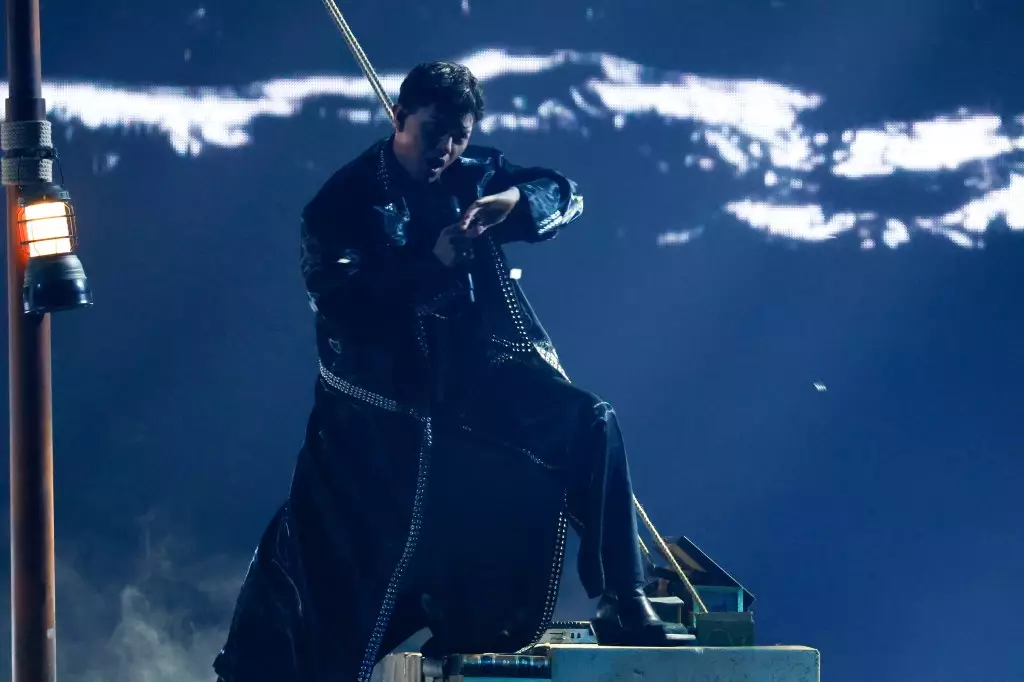The 69th edition of the Eurovision Song Contest this year, hosted in the majestic St. Jakobshalle arena in Basel, Switzerland, has not only captured the hearts of millions but has also rekindled the show’s spirit as the “granddaddy” of international musical competitions. This year’s event was particularly noteworthy—packed with talent and surprise—highlighting the purity of musical emotion that Eurovision embodies. As the curtains lifted, it became clear that the evening would be defined not merely by competitive fervor but also by heartfelt performances that tugged at the hearts of the audience, both on-site and across the globe.
JJ’s Emotional Breakdown: A New Era of Authenticity
Amidst a whirlwind of dazzling performances and high-energy acts, Austrian singer JJ emerged as the clear champion with his poignant ballad “Wasted Love.” His emotional delivery, coupled with a haunting falsetto that resonates with listeners, was not only a standout performance but a necessary reminder of the profound emotional connections music can forge. Upon receiving the coveted trophy, JJ was visibly moved, epitomizing a new era of authenticity in an industry often characterized by glitz over substance. His flabbergasted reaction as confetti showered down in celebration was indicative of the raw human experience that lies at the core of Eurovision.
Despite being a fierce competition, where the audience essentially bears witness to the ambition of various nations, JJ’s performance was like a soothing balm amidst the chaos of voter anticipation and rivalries. Tapping into universal themes of love and loss, he carved a niche that resonated deeply with both jurors and the public alike, showing that you do not always have to follow trends to be successful.
The Ups and Downs of Voting Dynamics
A fascinating aspect of the contest has always been its voting dynamics—an intriguing cocktail of national pride, viewer sentiment, and occasional surprises. The voting rounds this year were thrilling, with Austria and Switzerland exchanging the lead like a game of musical chairs, only to witness the latter ultimately suffer a shocking zero points. It was an unexpected twist for a host country, but this script was written by the viewers who delighted in Israel’s late surge, scrambling to catch up to Austria.
The unpredictability of the votes kept spectators at the edge of their seats. While the odds seemed stacked in favor of traditional powerhouses like Sweden and France, Israel’s sudden surge to the forefront was a reminder of how quickly fortunes can change in the world of Eurovision. The excitement of last-minute dreams being forged or dashed generates a unique viewing experience, allowing fans to embrace both hope and despair in rapid succession.
A Love Letter to Musical Diversity
The Eurovision Song Contest is not merely an event but a worldwide movement celebrating music’s ability to unite. This year’s vibrant displays showcased representatives from 37 nations, each bringing their unique musical stylings and cultural resonances. There’s something inherently beautiful in watching diverse acts share the stage, employing intricate set pieces and synchronizing with energetic background dancers who elevate the performances to another level. It’s not just a contest; it’s a festival where musical diversity shines, reminding everyone why they fell in love with artistic expression in the first place.
In a pre-recorded message, 1988 Eurovision winner Céline Dion made a heartfelt return to her roots, acknowledging the enduring legacy and growth of the contest. While her own health challenges have kept her from the stage recently, her connection to the event underscores the emotional ties that bind winners and participating nations. It’s a gentle reminder that Eurovision is inherently about community and shared experiences, transcending borders and language barriers alike.
Controversies and Conversations: A Need for Inclusivity
As with any major event, Eurovision has not escaped controversy, and this year was no different. Questions were raised surrounding Israel’s participation amidst ongoing conflict, leading to calls from various figures to reconsider the inclusivity of the contest. However, organizer Martin Green’s steadfast decision suggests a belief that music serves as a powerful medium for unity, even in turbulent times. While romantic, the vision is worthy—can a shared passion for music lead to understanding and reconciliation?
It may appear overly optimistic, yet the emotional landscapes traversed through songs often bridge gaps, forging connections amidst strife. As Eurovision unfolds, so too does dialogue—one that challenges us to reflect on what it means to celebrate diversity while addressing pressing global issues.

